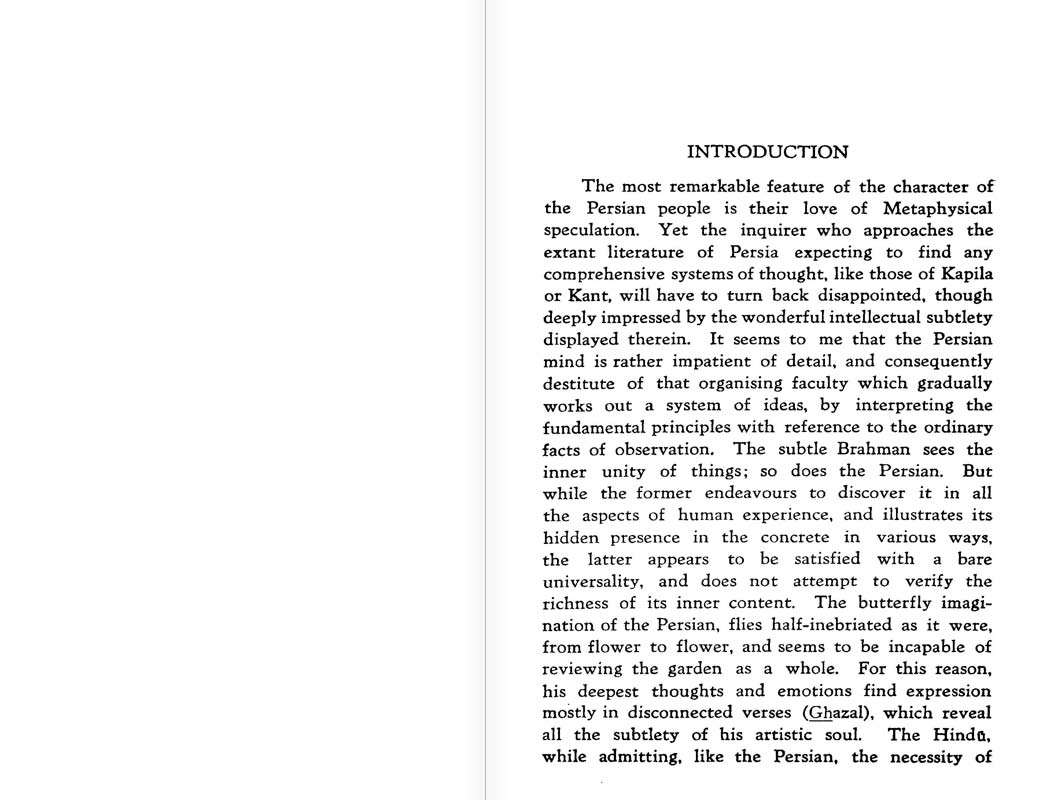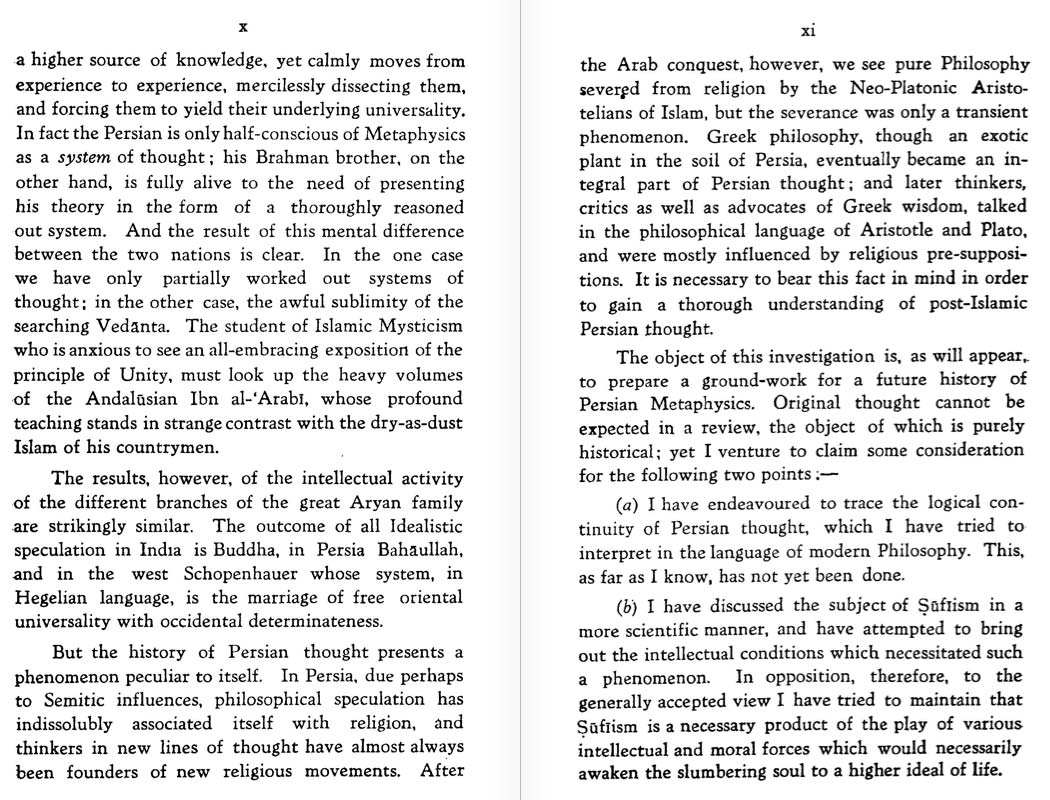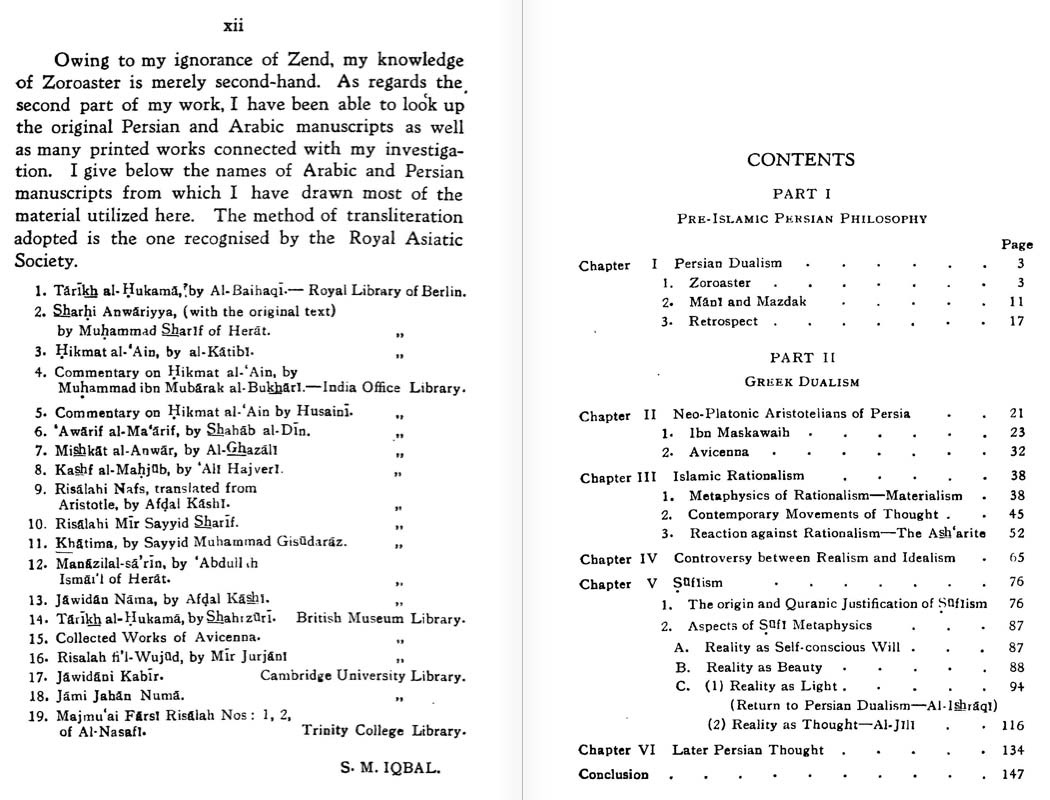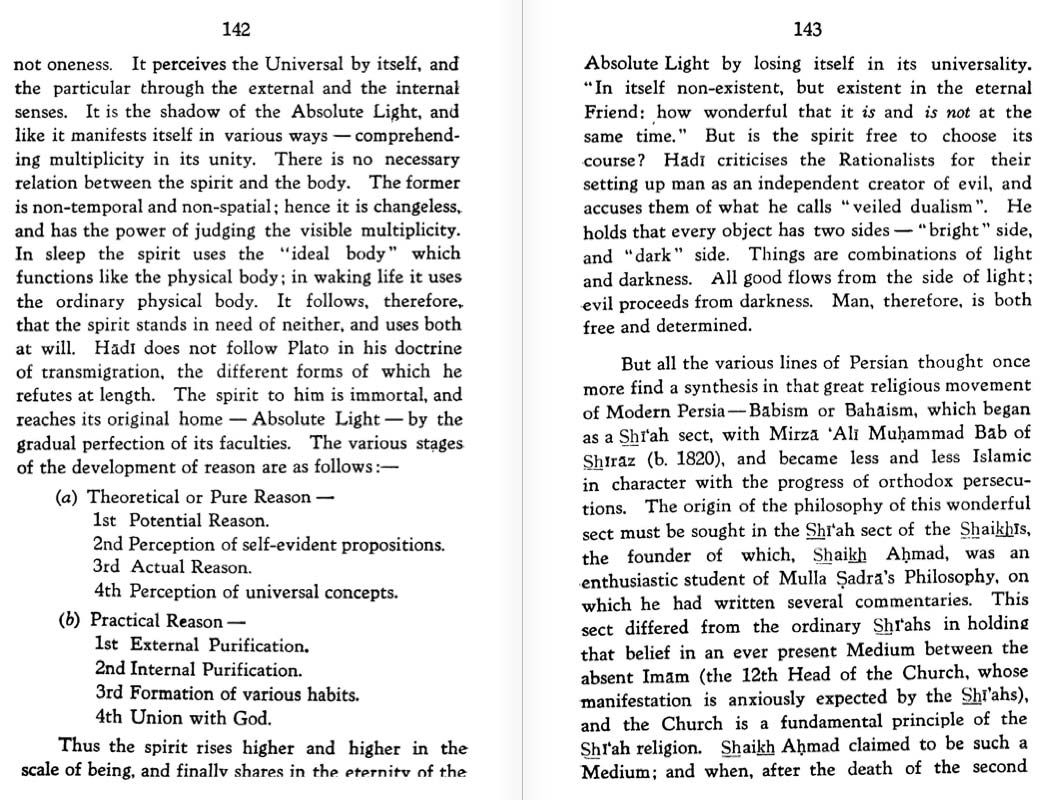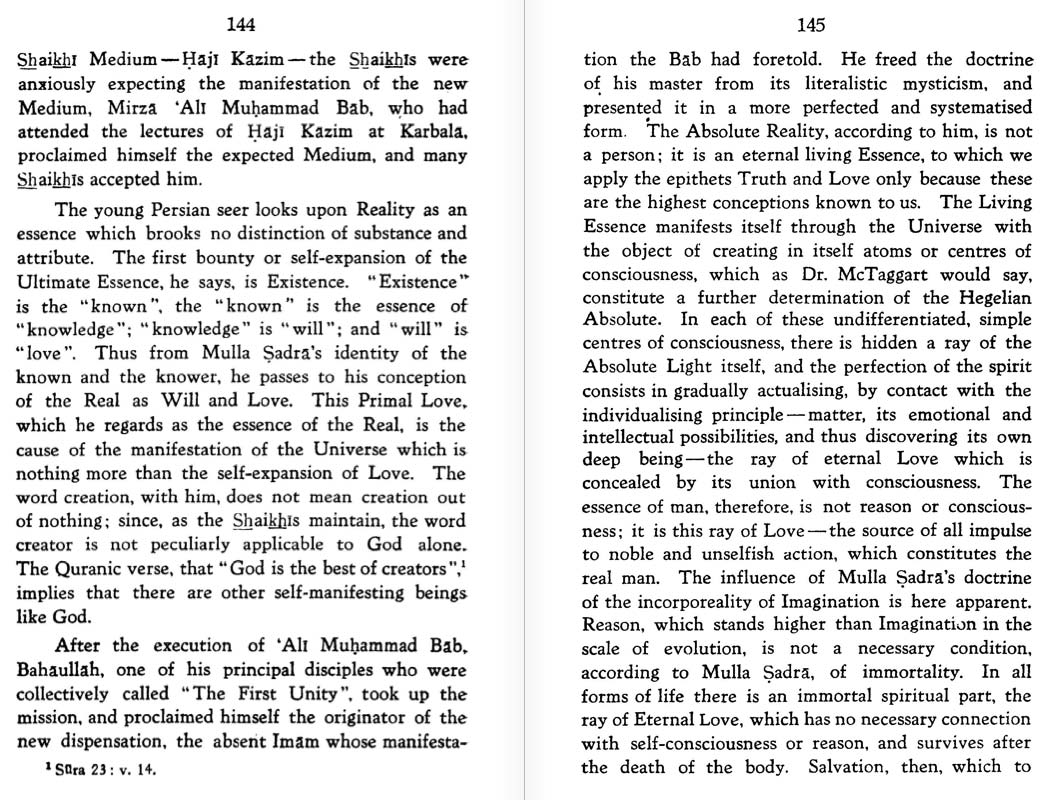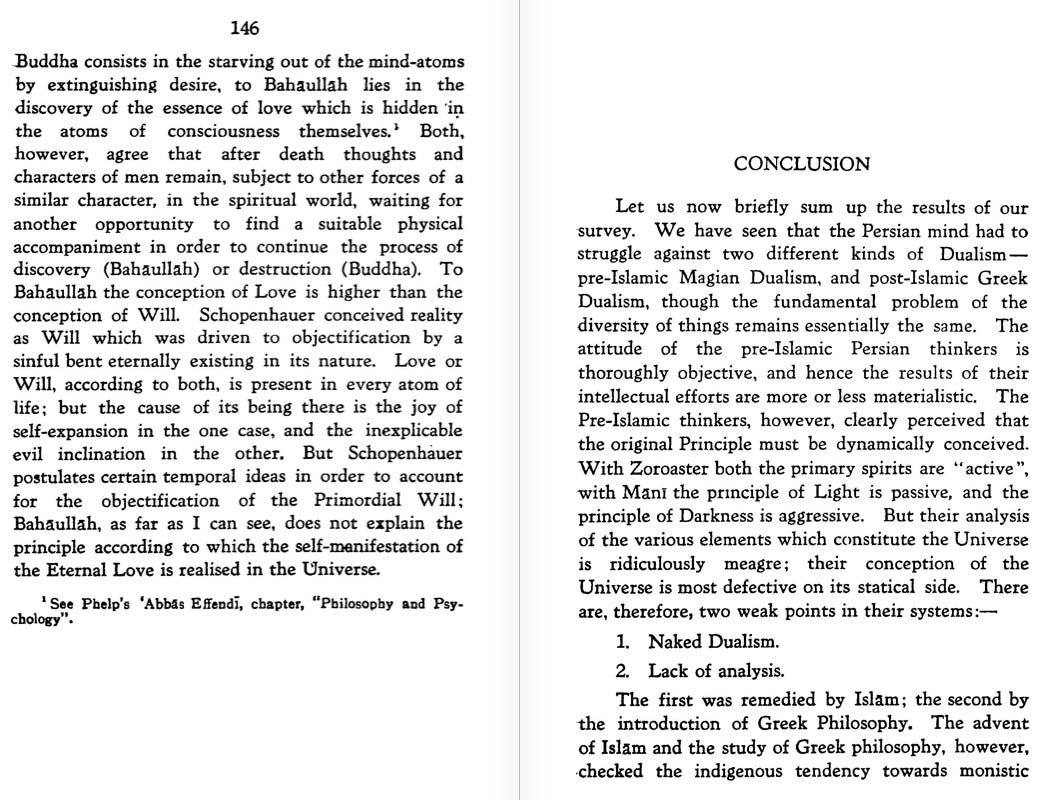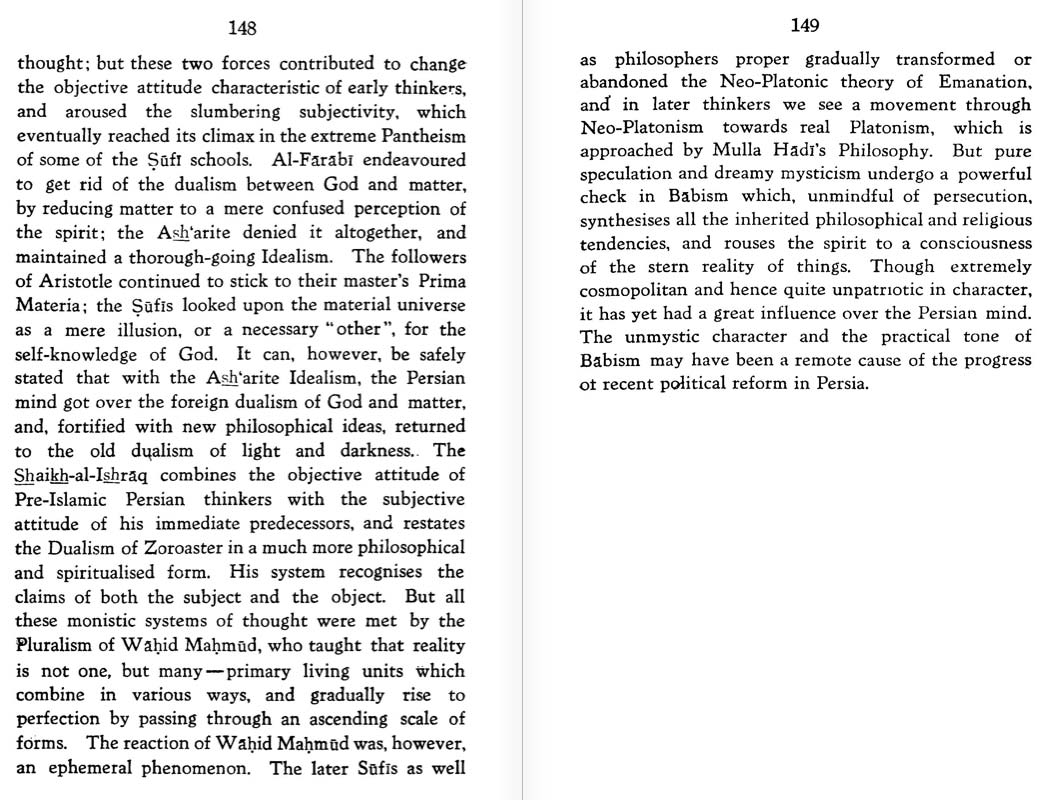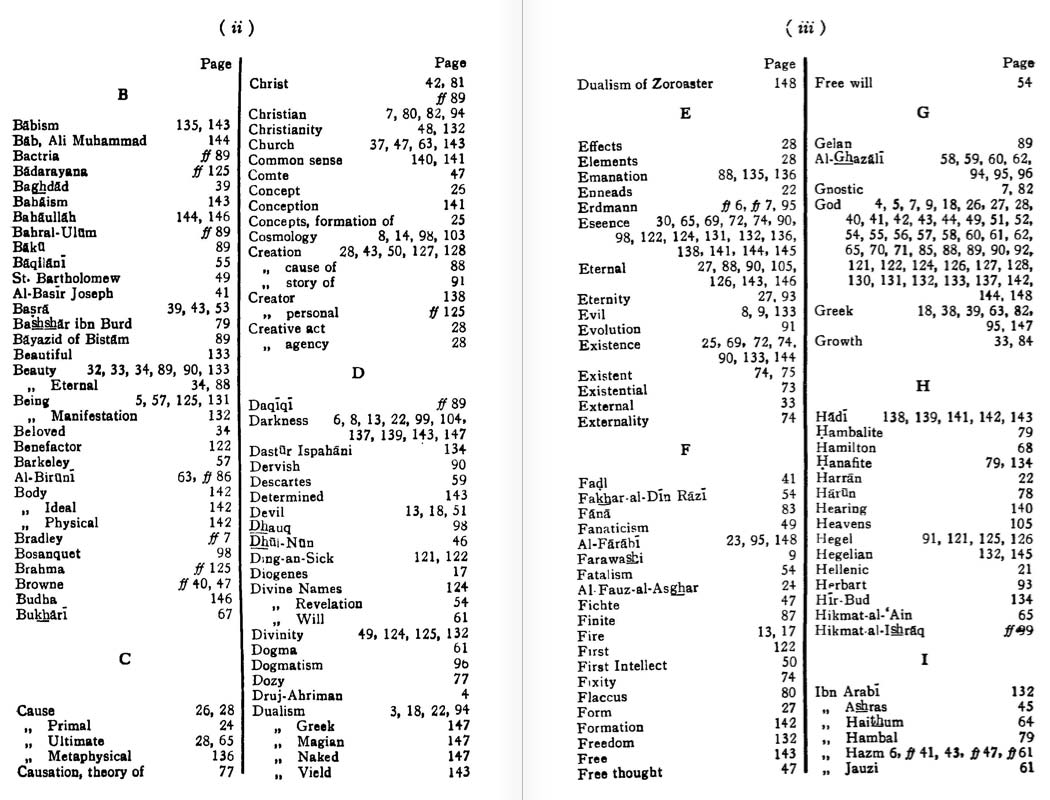
|
Abstract: Short philosophical observations on the theology of the Báb and Bahá'u'lláh. Notes: This book is available in a number of formats at archive.org. Another version, published by Luzac & Co. (London) with different formatting and pagination, is here (archive.org). For a reader friendly version, see Project Gutenberg, which has diacritics. See also Iqbál and the Bábí-Bahá'í Faith (A. Schimmel, 1990), Allamah Iqbal’s First Book (J. Walbridge, 2000), and Wikipedia. |
The Development of Metaphysics in Persia:
A Contribution to the History of Muslim Philosophy
by Muhammad Iqbal
pages x, 143-146, 149Lahore (Pakistan): Bazm-i-Iqbal, 1908
1. Text
[[page x]
... The results, however, of the intellectual activity of the different branches of the great Aryan family are strikingly similar. The outcome of all Idealistic speculation in India is Buddha, in Persia Bahaullah, and in the west Schopenhauer whose system, in Hegelian language, is the marriage of free oriental universality with occidental determinateness.
But the history of Persian thought presents a phenomenon peculiar to itself. In Persia, due perhaps to semitic influences, philosophical speculation has indissolubly associated itself with religion, and thinkers in new lines of thought have almost always been founders of new religious movements. ...
[page 143]
... But all the various lines of Persian thought once more find a synthesis in that great religious movement of Modern Persia — Babism or Bahaism, which began as a Shi'ah sect, with Mirza 'All Muhammad Bab of Shiraz (b. 1820), and became less and less Islamic in character with the progress of orthodox persecutions. The origin of the philosophy of this wonderful sect must be sought in the Shi'ah sect of the Shaikhs, the founder of which, Shaikh Ahmad, was an enthusiastic student of Mulla Sadrá's Philosophy, on which he had written several commentaries. This sect differed from the ordinary Shi'ahs in holding that belief in an ever present Medium between the absent Imam (the 12th Head of the Church, whose manifestation is anxiously expected by the Shi'ahs), and the Church is a fundamental principle of the Shi'ah religion. Shaikh Ahmad claimed to be such a Medium; and when, after the death of the second
[page 144]
Shaikhi Medium — Haji Kazim — the Shaikhis were anxiously expecting the manifestation of the new Medium, Mirza 'All Muhammad Bab, who had attended the lectures of Haji Kazim at Karbala, proclaimed himself the expected Medium, and many Shaikhs accepted him.
The young Persian seer looks upon Reality as an essence which brooks no distinction of substance and attribute. The first bounty or self-expansion of the Ultimate Essence, he says, is Existence. "Existence" is the "known", the "known" is the essence of "knowledge"; "knowledge" is "will"; and "will" is "love". Thus from Mulla Sadrá's identity of the known and the knower, he passes to his conception of the Real as Will and Love. This Primal Love, which he regards as the essence of the Real, is the cause of the manifestation of the Universe which is nothing more than the self-expansion of Love. The word creation, with him, does not mean creation out of nothing; since, as the Shaikhs maintain, the word creator is not peculiarly applicable to God alone. The Quranic verse, that "God is the best of creators",1 implies that there are other self-manifesting beings like God.
After the execution of 'All Muhammad Bab, Bahaullah, one of his principal disciples who were collectively called "The First Unity", took up the mission, and proclaimed himself the originator of the new dispensation, the absent Imam whose manifestation
- Sura 23: v. 14.
[page 145]
the Bab had foretold. He freed the doctrine of his master from its literalistic mysticism, and presented it in a more perfected and systematised form. The Absolute Reality, according to him, is not a person; it is an eternal living Essence, to which we apply the epithets Truth and Love only because these are the highest conceptions known to us. The Living Essence manifests itself through the Universe with the object of creating in itself atoms or centres of consciousness, which as Dr. McTaggart would say, constitute a further determination of the Hegelian Absolute. In each of these undifferentiated, simple centres of consciousness, there is hidden a ray of the Absolute Light itself, and the perfection of the spirit consists in gradually actualising, by contact with the individualising principle — matter, its emotional and intellectual possibilities, and thus discovering its own deep being — the ray of eternal Love which is concealed by its union with consciousness. The essence of man, therefore, is not reason or consciousness; it is this ray of Love — the source of all impulse to noble and unselfish action, which constitutes the real man. The influence of Mulla Sadrá's doctrine of the incorporeality of Imagination is here apparent. Reason, which stands higher than Imagination in the scale of evolution, is not a necessary condition, according to Mulla Sadrá, of immortality. In all forms of life there is an immortal spiritual part, the ray of Eternal Love, which has no necessary connection with self-consciousness or reason, and survives after the death of the body. Salvation, then, which to
[page 146]
Buddha consists in the starving out of the mind-atoms by extinguishing desire, to Bahaullah lies in the discovery of the essence of love which is hidden in the atoms of consciousness themselves.1 Both, however, agree that after death thoughts and characters of men remain, subject to other forces of a similar character, in the spiritual world, waiting for another opportunity to find a suitable physical accompaniment in order to continue the process of discovery (Bahaullah) or destruction (Buddha). To Bahaullah the conception of Love is higher than the conception of Will. Schopenhauer conceived reality as Will which was driven to objectification by a sinful bent eternally existing in its nature. Love or Will, according to both, is present in every atom of life; but the cause of its being there is the joy of self-expansion in the one case, and the inexplicable evil inclination in the other. But Schopenhauer postulates certain temporal ideas in order to account for the objectification of the Primordial Will; Bahaullah, as far as I can see, does not explain the principle according to which the self-manifestation of the Eternal Love is realised in the Universe.
- See Phelp's 'Abbas Effendi, chapter, "Philosophy and Psychology".
[[page 149]
... The later Sufis as well as philosophers proper gradually transformed or abandoned the Neo-Platonic theory of Emanation, and! in later thinkers we see a movement through Neo-Platonism towards real Platonism, which is approached by Mulla Hadi's Philosophy. But pure speculation and dreamy mysticism undergo a powerful check in Babism which, unmindful of persecution, synthesises all the inherited philosophical and religious tendencies, and rouses the spirit to a consciousness of the stern reality of things. Though extremely cosmopolitan and hence quite unpatriotic in character, it has yet had a great influence over the Persian mind. The unmystic character and the practical tone of Babism may have been a remote cause of the progress of recent political reform in Persia. ...
2. Image scans (click image for larger version)
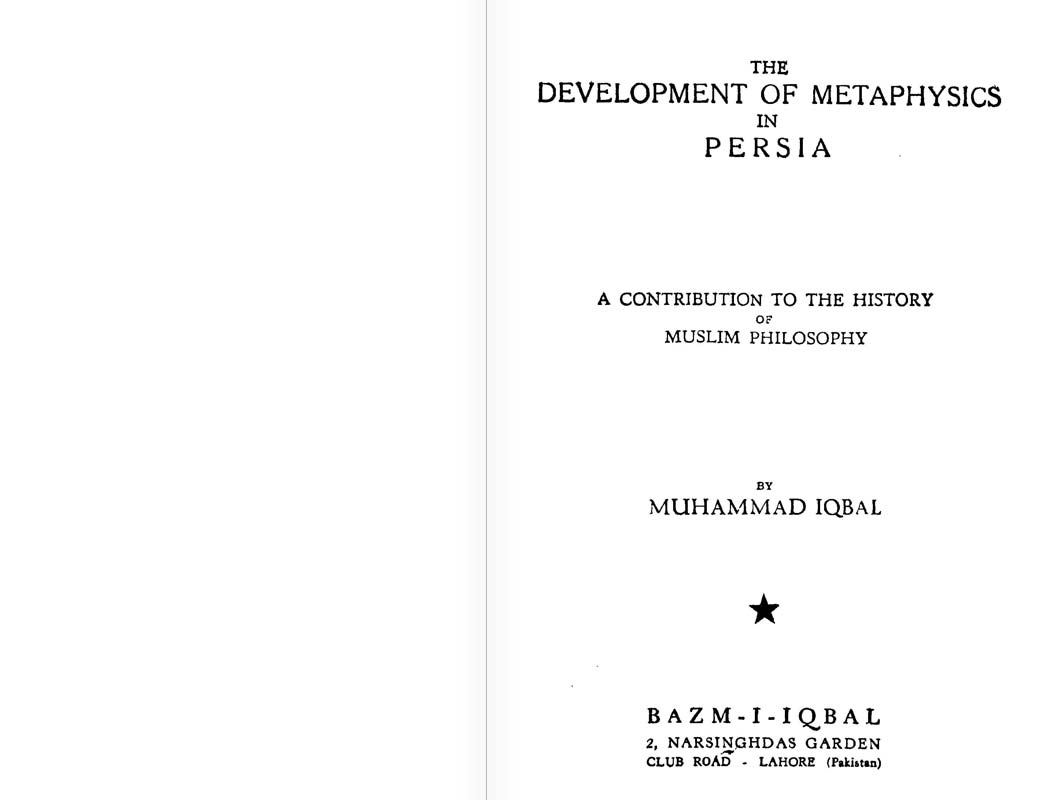
|
|
